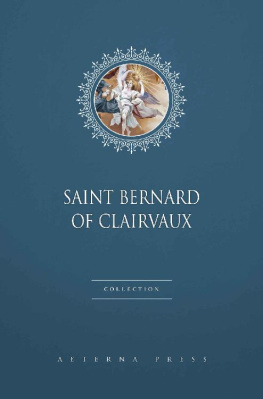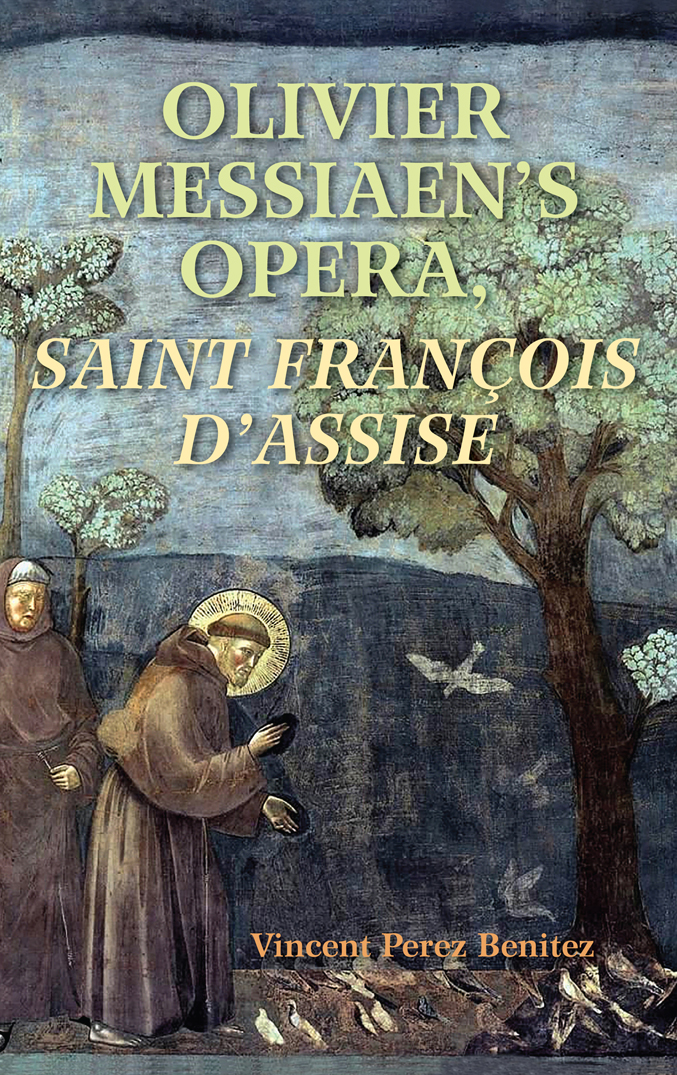Table of Contents
Guide
I WANT TO THANK A NUMBER OF PEOPLE who helped make this book possible. I owe a special debt of gratitude to all my organ professors, who taught me how to play the instrument that Olivier Messiaen played, which paved the way for my present work on his music. I would also like to thank the late William Peters Latham, composer and former Distinguished Professor of Music at the University of North Texas (UNT), for unveiling the world of contemporary music to me through composition lessons and a doctoral analysis seminar, which he allowed me to take as a masters student in organ performance at UNT. Sincere thanks also go to Eric J. Isaacson for serving as the adviser for my PhD dissertation on Saint Franois dAssise at Indiana University and to the other members of the dissertation committee: Lewis Rowell, Robert Hatten, and Thomas Mathiesen.
Several decades of Messiaen scholarship precede this book, and I am indebted to the pioneering work of all those who have deepened our understanding of this great composer. As a music theorist and organist writing on Messiaen, I could not have contributed to this literature without them.
Special thanks go to Joseph N. Straus for not only mentoring me throughout my early academic career as a music theorist but also encouraging my work on Messiaen. I am also grateful to Sue Haug, former director of the School of Music at the Pennsylvania State University, and David Frego, current director, along with my colleagues in music theory and musicology, for their encouragement and support of this book. Sincere thanks are extended to double bassist Rob Nairn, former Distinguished Professor of Music at Penn State and currently on the music faculty at the University of Melbourne Conservatorium of Music, for his reminiscences as principal bassist of the Hall Orchestra (under the direction of Kent Nagano) about the performances and recording in 1998/1999 of Messiaens Saint Franois dAssise in Salzburg, Austria. I am also pleased to thank Penn States former Institute for the Arts and Humanities and College of Arts and Architecture for faculty research grants to support my travel to France and Italy in 2006 to conduct research on Messiaens Saint Franois. Additional thanks go to the institute for a residency during the spring of 2010 to write part of this book and another research grant to fund travel to Paris in 2014 to study Messiaens birdsong notebooks at the BnF. Sincere thanks are also due to the Society for Music Theory for awarding me a subvention grant for the continued study of the composers birdsong notebooks in 2015.
I convey my heartfelt thanks to Gerald Levinson and Brian Schober, Messiaens former students at the Paris Conservatoire in the 1970s, for their valuable recollections of the composer. I am also pleased to thank Jessica Meuriot for her assistance in various matters related to my research and for making it possible to spend two hours playing the historic Cavaill-Coll grand orgue at La Trinit on March 5, 2012. Sincere appreciation likewise goes to Carolyn Schuster-Fournier, who graciously welcomed me during my several visits to La Trinit in Paris.
I am particularly grateful to Jon Gillock for sharing informative reminiscences and materials associated with Messiaen over the past several years. Although I only corresponded with her briefly, I want to thank the late Yvonne Loriod-Messiaen for her support of my book on her husbands opera. And thanks likewise go to Jean Leduc, former head of ditions Alphonse Leduc, for sharing information about the publication history of Saint Franois dAssise. I would also like to thank Pre Pascal Ide, Catholic theologian (particularly with respect to Hans Urs von Balthasar), the head of the office of the Congrgation pour lducation catholique in Rome, and an educator and professor at the Saint Joseph Seminary, Bordeaux, for granting me an interview on June 11, 2016, in Paris in order to discuss the role of theology in Messiaens music. And to Pre Jean-Rodolphe Kars, former concert pianist and current chaplain at the Basilica of Paray-le-Monial, France, I express my deep gratitude for his continued encouragement of my research on the life and music of the matre.
To Kevin Mongrain, associate professor of theology in the McAnulty College and Graduate School of Liberal Arts, Duquesne University, Pittsburgh, I convey my thanks for his insights into the religious thought of Hans Urs von Balthasar.
To Claude Samuel and Catherine Massip of the Fondation Olivier Messiaen, and Hlne Frichot of the Fondation de France, I express my deep appreciation for granting me permission to examine different manuscripts of Messiaen at the BnF during the past several years. I am also grateful to Catherine Massip, Elizabeth Giuliani, and Mathias Auclair, former and present directors of the Dpartement de la Musique, BnF, and Marie-Gabrielle Soret, who presently administers the Fonds Olivier Messiaen at the BnF, and their colleagues, for their assistance during my visits to Paris to examine these manuscripts.
Raina Polivka, music, film, and humanities editor, as well as her successor, Janice E. Frisch, of Indiana University Press, provided valuable assistance at each stage in the development of this book. I would also like to thank the anonymous reviewers of this book for supplying critiques that improved its quality. For permission to reproduce two chord successions in analytical reductions from a Messiaen birdsong notebook from 1984, I am grateful to the Fondation Olivier Messiaen and the Fondation de France. I thank ditions Alphonse Leduc, Paris, and Hal Leonard, their print representative in the United States, for granting me permission to reproduce transcriptions of musical passages from the full score of Saint Franois dAssise and other works of Messiaen. I also convey my gratitude to the Taylor & Francis Group for allowing me to reuse musical examples from my article Aspects of Harmony in Messiaens Later Music: An Examination of the Chords of Transposed Inversions on the Same Bass Note, published in the Journal of Musicological Research in 2004.
Finally, without the love, patience, and support of my wife, Esther Ann Wingfield Benitez, this book could never have been written. I extend my deepest thanks to her. She has encouraged and supported me during every phase of this long journey with Saint Franois and has helped enormously with numerous practical matters associated with the book. I owe her so much and am so thankful that she has been by my side for so long.
Note
. The musical examples in question are as follows, with their counterparts from the book provided in parentheses: ex. 1 (4.1), ex. 5d (8.3), ex. 6a (4.9a), exs. 6cd (4.9bc), exs. 9ab (4.8b), exs. 10ab (4.8cd), exs. 11ab (4.8a), and ex. 15a (8.4b). See Vincent P. Benitez, Aspects of Harmony in Messiaens Later Music: An Examination of the Chords of Transposed Inversions on the Same Bass Note, Journal of Musicological Research 23, no. 2 (AprilJune 2004): 187226.
Act I
Scene 1: La Croix
Messiaen entitled scene 1 la folie de la Croix (The Folly of the Cross), as evidenced by its title page in the short score of Saint Franois dAssise. Having second thoughts, he crossed out la folie de, leaving la Croix, the title we know today. But the scenes original title gives us insights into Messiaens thinking regarding the theological import of the Cross, not only in scene 1 but in the opera as a whole. The folly of the Cross is derived from 1 Corinthians 1:18: The message of the cross is folly for those who are on the way to ruin, but for those of us who are on the road to salvation it is the power of God. The phrase, in light of the entire verse, reflects the paradox of Christ, the Son of God in Christian theology, who suffers a horrible death on the Cross as a condemned criminal while simultaneously demonstrating a divine sacrificial love that shows humanity the path toward salvation. In essence, the Cross is a powerful symbol of conversion reconciling humanity to God, a major theological theme of
Next page
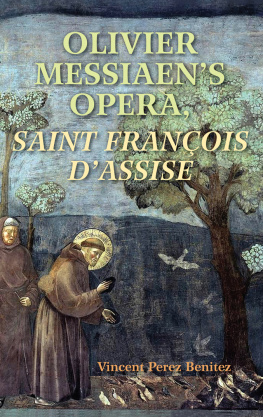
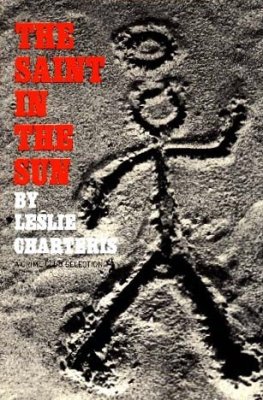


![Saint Francis de Sales [Sales - The Saint Francis de Sales Collection [15 Books]](/uploads/posts/book/266802/thumbs/saint-francis-de-sales-sales-the-saint-francis.jpg)
![Louis de Montfort - The Saint Louis de Montfort Collection [7 Books]](/uploads/posts/book/265822/thumbs/louis-de-montfort-the-saint-louis-de-montfort.jpg)
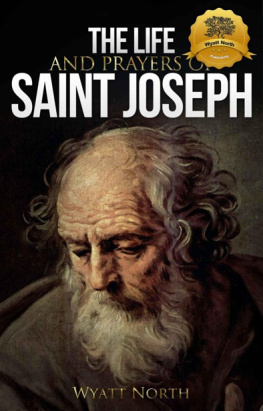
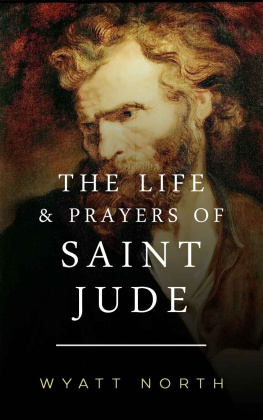
![Saint Francis de Sales - The Saint Francis de Sales Collection [15 Books]](/uploads/posts/book/161144/thumbs/saint-francis-de-sales-the-saint-francis-de-sales.jpg)
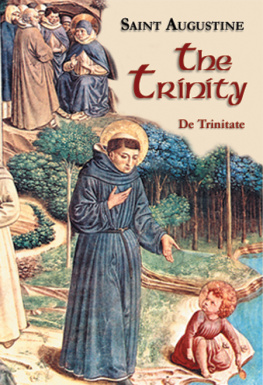
![Saint Alphonsus de Liguori - The Saint Alphonsus de Liguori Collection [30 Books]](/uploads/posts/book/134324/thumbs/saint-alphonsus-de-liguori-the-saint-alphonsus-de.jpg)
